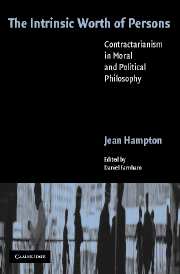Book contents
5 - The Common Faith of Liberalism
Published online by Cambridge University Press: 14 January 2010
Summary
Early in the introduction of his new book Political Liberalism, John Rawls states the problem his book will address: “How is it possible that there may exist over time a stable society of free and equal citizens profoundly divided by reasonable though incompatible religious, philosophical and moral doctrines?” (p. xviii). Rawls appreciates, but rejects, the traditional liberal answer to this question:
Sometimes one hears reference made to the so-called Enlightenment project of finding a philosophical secular doctrine, one founded on reason and yet comprehensive. It would then be suitable to the modern world, so it was thought, now that the religious authority and the faith of Christian ages was alleged no longer dominant.
(p. xviii)Henceforth I will call “Enlightenment liberalism” the view that there exists a secular political conception, that we can find and know to be correct via the use of our reason, which can unify a pluralist society and provide a just and stable foundation for its political life. Such a liberalism is an example of what Rawls calls a “comprehensive moral view” insofar as it makes moral commitments in a number of areas – commitments which it takes to be true and which it claims all persons can understand to be true if they reason correctly.
Rawls quite clearly rejects the Enlightenment idea that reason can yield a true comprehensive (and secular) conception of justice that can bind a pluralist society.
- Type
- Chapter
- Information
- The Intrinsic Worth of PersonsContractarianism in Moral and Political Philosophy, pp. 151 - 184Publisher: Cambridge University PressPrint publication year: 2006



